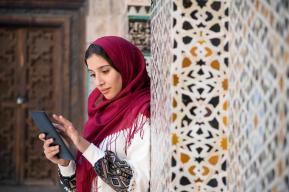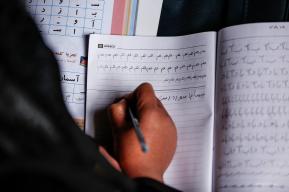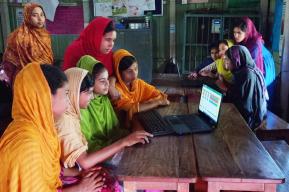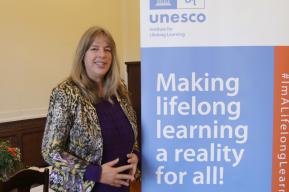News
Youth from around the world share their views on International Literacy Day

Despite progress, at least one out of seven youth and adults globally - 763 million people - lacked basic literacy and numeracy skills in 2020. Tackling this major challenge involves dramatic adjustments in our thinking, approaches and behaviour, in addition to redoubling our efforts.
On the occasion of International Literacy Day 2023, UNESCO together with the SDG4Youth Network interviewed young people from seven countries to capture their views on peace and sustainable development, what they envision for themselves and future generations, the role of literacy, and our shared global challenges.
What difficulties do you think young people around you face in a rapidly changing world?
“The most pressing challenge being the education gap. Access to quality education directly impacts their future prospects, from finding meaningful employment to contributing to climate action and promoting peace and security.”
Najib Mattar, 20, male student from Lebanon
“In a rapidly changing world, young refugees face numerous challenges. Forced displacement, limited access to education, social and cultural integration difficulties, and mental health and trauma issues compounded with economic hardships, legal and documentation problems, and limited opportunities for skill development.”
Mursal Mohammadi, 24, female visual storyteller from Afghanistan
“As youth are increasingly demanding more just, equitable and progressive opportunities and solutions in their societies, the need to address the multifaceted challenges faced by young people (such as access to education, health, employment and gender equality) have become more pressing than ever.”
Najer Michadal, 15, male student from the Philippines
What does the word “peaceful” mean to you?
“The word "peaceful" goes beyond just the absence of conflicts and war. It embodies a state of harmony and tranquility where people can thrive, and it's built upon the pillars of stability, equity, justice, and abundant opportunities for everyone.”
Najib Mattar, 20, male student from Lebanon
“If achieved, peace will teach us to live with other people, even if they are of different origins or religions. Sustainability is a part of peace, and if peace is achieved, we will be able to build sustainable communities where people can live healthy lives.”
Omran Al Mounlla, 18, male student from Syria living in Lebanon
“To me, "peaceful" goes beyond just no violence. It means a calm and harmonious state where both men and women have equal opportunities, especially in education.”
Mursal Mohammadi, 24, female visual storyteller from Afghanistan
What does the word “sustainable” mean to you?
“Sustainability, in my view, involves a deep commitment to social responsibility. It means pursuing practices and initiatives that not only meet the needs of the present but also safeguard the well-being of future generations.”
Najib Mattar, 20, male student from Lebanon
“Sustainable" actions are crucial for a positive impact on our environment and future. It's about balancing present needs with preserving resources. Education and accessible opportunities play a role in achieving sustainability.”
Mursal Mohammadi, 24, female visual storyteller from Afghanistan
What kind of future do you want?
“I dream of a world where every person lives a life free of violence, and where their fundamental human rights are always upheld.”
Arissa Roy, 17, female student from Canada
“I would like a future that is economically stable; a society that can cope with economic inflation and not leave anyone behind.”
Jazper Jhun DC. Bautista, 18, male student from the Philippines
“It is a world where education is a universal right, ensuring that every child has access to schooling and equipping every young person with the skills they need to thrive in their endeavors.”
Najib Mattar, 20, male student from Lebanon
Can you imagine a society that is both peaceful and sustainable? If so, what would it look like to you?
“In my experience, a ‘peaceful’ society means more than just no violence. When I was born, girls in my country, Afghanistan, couldn't go to school, but later, schools allowed girls like me to attend. However, the peace didn't last, and now things are worse for girls again. True peace means giving freedom and equal chances to everyone, no matter their gender or identity.”
Mursal Mohammadi, 24, female visual storyteller from Afghanistan
“In this harmonious future, collaboration and empathy guide decision-making processes, and societies are driven by a profound understanding of interconnectedness.”
Najib Mattar, 20, male student from Lebanon
What is the role of literacy in a society that is both peaceful and sustainable?
“Literacy empowers and liberates people. Beyond its importance as part of the right to education, literacy improves lives by expanding capabilities which in turn reduces poverty, increases participation in the labour market and has positive effects on health and sustainable development.”
Najer Michadal, 15, male student from the Philippines
“Literacy is one of the key United Nations Sustainable development goals, which connects to all the others. Knowledge is the key to action. Education eradicates taboos, false information, and ignorance, while promoting critical thinking and self/community awareness.”
Arissa Roy, 17, female student from Canada
“In my view, a peaceful and sustained society is one where women have equal access to all aspects of life. Literacy plays a crucial role in bringing about these changes, empowering young people and women to be at the forefront of this transformation.”
Mursal Mohammadi, 24, female visual storyteller from Afghanistan
“Literacy is fundamental in the holistic development of youth. Literacy precedes comprehension.”
Jazper Jhun DC. Bautista, 18, male student from the Philippines
Has the lack of literacy skill impeded you in landing a job or participating in any other activities?
“I once went to ask for a job as a driver for a company in Kamuli. They asked me if I went to school and if I could speak English and I said NO. I wasn’t given the job, even though I can drive.”
Isaac Lyagoba, 22, male, motorcycle rider from Uganda
What message would you like to give on the occasion of International Literacy Day to those who cannot read and write?
“My message would be to keep motivation to learn. We are all students of life, so whether you know something or not, keep the will to learn or to improve every single day.”
Simrat Lakhian, 19, female student from Canada
“Your circumstances don't define you. Embrace the journey to literacy; it opens up endless possibilities. Look for chances to learn; it's never too late to start. Your determination can bring positive changes in your life and others.”
Mursal Mohammadi, 24, female visual storyteller from Afghanistan
What do you expect UNESCO to do to promote literacy for young and adult people?
“I expect UNESCO to hold leaders accountable for their commitment to education advancement and support grassroots organizations working locally in communities, through funding, awareness, and policy connection.”
Arissa Roy, 17, female student from Canada






